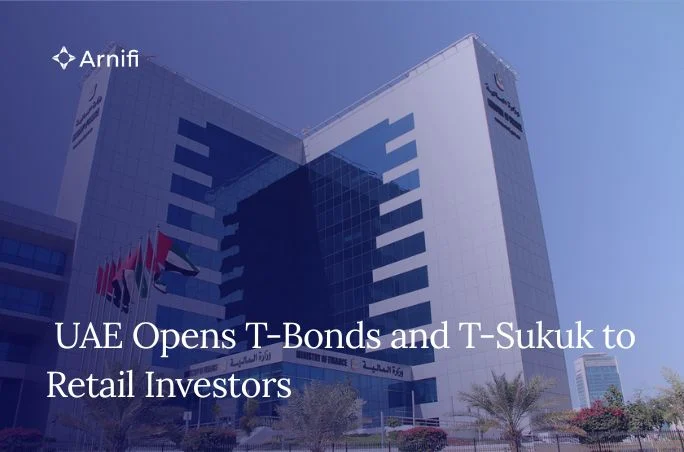UAE Expands Retail Access to Sovereign Debt | AED 4,000 Entry Opens T-Bonds and T-Sukuk to Individual Investors
by Ishika Bhandari Nov 26, 2025  7 MIN READ
7 MIN READ

Table of contents
The UAE has stepped quite significantly toward broadening financial inclusion and deepening its domestic capital markets with the latest phase of the Retail Sukuk Initiative, allowing citizens and residents to invest in government Treasury Bonds (T-Bonds) and Treasury Sukuk (T-Sukuk), with a minimum entry point of AED 4000.
In the new development, the Ministry of Finance (MoF) has signed a major agreement with Emirates NBD, one of the largest banks in the country, providing retail investors with direct access to these sovereign-backed instruments via digital interfaces. This agreement is the second of its kind since the signing of a previous agreement with Abu Dhabi Islamic Bank (ADIB), thus further establishing the UAE’s commitment to empowering individuals to participate in matters related to national financial markets.
A Major Shift for Retail Investors
Traditionally, the UAE’s T-Bond and T-Sukuk markets were dominated by institutional players, such as banks, pension funds, and large investment firms. There was seldom any entry-level for retail investors, even though they were low-risk instruments with steady yields.
Now comes the Retail Sukuk Initiative. UAE nationals and residents are able to invest in government debt instruments using the digital platforms of participating banks. By registering with their Emirates ID or UAE PASS, users complete KYC procedures, draw personal risk profiles, and can directly view the available offerings.
With the AED 4,000 minimum investment requirement, the entry barrier has been substantially lowered. Retail customers could then subscribe to government issuances or trade them afterward through the partner bank’s apps. This opens a much wider channel for investor participation and provides an option for safe, structured investment even for first-time investors.
Aligning With National Strategy
On the significance of the partnership, Younis Haji Al Khoori, Undersecretary of the Ministry of Finance, noted that it is in line with the national vision to expand the participation of UAE citizens and residents in long-term investment and structured savings.
He added that the Retail Sukuk Initiative stands as a core activity that will allow individuals to access secure government-backed financial instruments through seamless digital processes. The initiative contributes to the ministries’ national goals regarding financial literacy, personal savings, and increasing awareness and involvement of the community in the wider economic development of the country.
A Fundamental Enabler within the Frame of UAE Strategy for the “Year of Community 2025”, which promotes sustainable financial behavior, responsible economic participation, and the well-being of communities. In encouraging households to adopt structured saving habits, the initiative aims to act as an antidote against financial vulnerability and to instill good financial planning habits in society.
Emirates NBD’s Role and Vision
Ahmed Al Qassim, Group Head of Wholesale Banking at Emirates NBD, stated from a banking viewpoint that the bank has long been involved in supporting market development instigated by the government. He added that the present partnership goes beyond creating client access to a new product to contributing towards the growth of the local debt capital market of the UAE.
Emirates NBD is integrating T-Bonds and T-Sukuk subscriptions into its ENBD X mobile app, which allows customers to digitally subscribe for new issuances, track their holdings, and trade on the secondary market. The bank intends to provide education, guidance, and investor surveys to first-time users.
The secondary market access is especially important, as this gives smaller investors some flexibility to buy and sell positions, rather than just locking in one-time long-term holdings. As more users enter, we expect the market to be more liquid and vibrant, which will serve as an additional catalyst for building a healthy domestic debt ecosystem.
Supporting Shariah-Compliant Finance
A cornerstone of the initiative is T-Sukuk, which complies with the principles of Islamic finance. Sukuk instruments rely on tangible assets or investment activities, making them compliant with Shariah rules. The instruments are enticing to Muslim investors, who will purchase them instead of non-interest-based financial products.
The issuance of sukuk in small denominations is the real democratizing access perspective to Islamic investment opportunities. These are instruments previously held in concentration by major institutional investors and now available to everyday customers seeking ethical, stable returns and government creditworthiness backing.
This strategic decision strengthens the UAE’s status as the global hub of Islamic finance. Sukuk issuance has been steadily increasing across the GCC, and retail involvement will deepen the market and stabilize it in the longer term.
Earlier Partnerships and Expanding Access
The recently announced Emirates NBD agreement marks the second partnership founded under the Retail Sukuk Initiative. The first partnership was signed with Abu Dhabi Islamic Bank (ADIB) earlier in November, when ADIB facilitated retailing of fractional sukuk units starting from AED 4,000 and further in multiples of AED 4,000.
Through the ADIB model, customers may invest in sukuk for up to AED 28,000 per transaction, with further growth planned as the programme develops. The Ministry of Finance plans to bring more agreements with banks within the UAE soon to ensure broader dissemination and accessibility across the nation.
With every new bank partnership, this initiative is expanding, both in reach and in flexibility for customers.
Strengthening the National Capital Markets
Economists and industry experts base their forecast that the Retail Sukuk Initiative will benefit the financial system of the UAE in many different ways.
1. Diversifying the Investor Base
By opening sovereign debts to the retail category, there is no over-reliance upon institutional investors, and ownership can be spread widely. This kind of broader buy-in can help stabilize markets in times of volatility.
2. Enhancing Domestic Liquidity
Liquidity in the market for government securities will improve simply by increased retail investor participation in the purchase and trading of government securities. A more vibrant secondary market is good for both the government and the investors.
3. Supporting Financial Inclusion
While boosting household savings behaviour by establishing low entry thresholds under clear regulatory frameworks for them to invest, the initiative shall also support financial inclusion. This exposure to government-backed securities should instill a culture of long-term planning and responsible money management.
4. Boosting Islamic Finance
Retail access to sukuk should strengthen the UAE’s ambition of being a global leader in Islamic finance. It is expected that more retail sukuk activity would dovetail with the increasing regional appetite for Shariah-compliant investments.
Challenges on the Horizon
Although the Retail Sukuk Initiative has ambitious aims, it must successfully address challenges for its long-term success.
Financial Literacy Gap
Most first-time investors will not know about bonds and sukuks, how return is generated, or how these bonds are traded in the secondary market. Educational content would be key.
Liquidity Building
Although the secondary market is expected to develop, the establishment of meaningful liquidity will depend on substantial participation therein. Trading volumes may take time before becoming comfortable.
Transaction Limits
Transaction limits such as the AED 28,000 limit under the ADIB structure may inhibit the swift formation of sizeable holdings by knowledgeable investors.
Maintaining Transparency
Transparency will be key in establishing and retaining trust among retail investors, with risks, returns, and Shariah Compliance clearly communicated.
A Transformational Step for Retail Finance
The Retail Sukuk Initiative of the UAE marks a strategic shift in the conduct of sovereign debt markets in the nation. The Ministry of Finance is reforming public participation in national economic development by granting access to government instruments that were once largely an exclusive province for institutional investors.
Empowering the individual with a safe, low-risk investment option backed by the full faith and credit of the UAE Government, this launch calls for more banks and digital platforms to join in, with financial literacy schemes coming into play, thereby giving rise to an informed, proactive, retail investor class.
If successful, this model will serve as a template for other countries looking to democratize access to public financial instruments through digital means. As yet again, the UAE is placing itself as a leader: opening new doors to financial inclusion, strengthening capital markets, and promoting sustainable long-term savings among its people.
Top UAE Packages

Related Articles
Top UAE Packages



